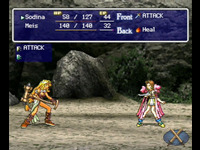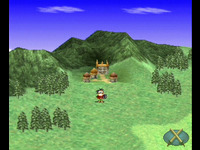|
|

|
PLATFORM
|
PS1
|
BATTLE SYSTEM
|

|
INTERACTION
|

|
ORIGINALITY
|

|
STORY
|

|
MUSIC & SOUND
|

|
VISUALS
|

|
CHALLENGE
|
Easy
|
COMPLETION TIME
|
20-40 Hours
|
|
OVERALL

|
+ Amusing situations & dialogue
+ Interesting intimacy development
- Sluggish, dull combat
- Overarching story is dull
- Cruddy navigation
|
Click here for scoring definitions
|
|
|
Not many games that dabble seriously in the dating sim area cross the Pacific even today, so Atlus was taking a serious chance upon localizing Thousand Arms back in 1999. The game's developer pedigree was at least the solid one of Red Company, even though not many players outside Japan were familiar with the studio. The game itself is certainly unique among the titles seen outside Japan, and many of its deviations from the RPG norm have yet to be appropriated by other developers. Particularly in its combat, Thousand Arms unfortunately displays what not to do, so leaving most of these ideas stranded is understandable.
A young man named Meis is displaced from his ancestral location by an influx of nefarious forces that answer to a far-off Emperor. Having been forced to find a new home, Meis ends up putting the skill of his family to work by training as a Spirit Blacksmith under the tutelage of a veteran in the field, named Jyabil. The training does not progress too far before Imperial forces once again make their presence felt in an intrusive manner, and Meis is off on a journey to acquire the powers of the elements to oppose the Emperor's evil design — along with trying his hardest to ingratiate himself with the opposite sex.
Thousand Arms earns kudos for making Meis about as horny as males at the age of sixteen tend to be. Rarely when playing the game will a choice for Meis's dialogue options be free of innuendo, and he leaves no room for doubt about the top priority on his adolescent mind. The question of how the females who accompany him on the quest deal with his no-doubt constant ogling is never really addressed, but the scenarios and dialogue it gives rise to make certain Thousand Arms stays memorable.
Memorability is a quality the main tale sadly lacks. The rogue's gallery of maniacal villains at the Emperor's beck and call comes across as amusingly silly opponents who would fit into the Disney Afternoon without a problem, but the more serious antagonists are forgettable. A tale of light and dark coming together violently was nothing new in 1999, and would have required considerable effort to be made interesting. Red did a comparatively lackluster job with the more serious moments of the game, and thus large swathes are uninteresting.
 Meis is probably in back so he can stare at the girls - it's in character.
Meis is probably in back so he can stare at the girls - it's in character.
|
|
Fortunately taking a break in the plot to date the women is usually an option. Meis can alter their feelings for him by giving gifts, playing minigames, or picking a response to a variety of statements and questions they vocalize while on a date. Doing this is fun for awhile, particularly if one is trying to see just how horny Meis can act. Despite the variety of things the girls can say repetition will eventually set in and never having more than two options for a response frequently feels limiting.
Going through the dating process is necessary due to the unusual method by which characters learn new spells and attacks, so becoming accustomed to it is vital. As a Spirit Blacksmith Meis is naturally capable of putting his skill to work, and in this game having him hammer on a character's weapon imbues it with new attributes. The catch comes from him needing a female partner to assist the ironwork, as strengthening the equipment grants it new abilities that can be extremely helpful in combat. These abilities are determined by Meis's choice of a partner when pounding the anvil, and changing the feelings of the females for him likewise alters the things they will pass on in the process. This makes the process of character improvement a fascinating deviation from the standard, but also a very time-consuming one that will require quite a bit of patience.
Time consuming proves an excellent introduction to the combat of Thousand Arms, in which the player gets to experience an odd blend of active time battle with standing around. Though three characters can appear in battle, only the one designated to stand in the front actually gets to attack enemies directly. The other two can use supportive spells and items, or they can stand around tossing out random cheers and taunts of minor benefit while the front character deals with the opposition. The active time element comes from waiting to carry out actions after they are selected with a button press, which means that without spot-on timing from the player enemies can and will act just a little bit faster on many occasions. The engine is thus an odd mix of waiting around to hammer on a button in a hurry, in which two thirds of the participants generally have nothing to do. The bizarre status of the back row continues when it becomes time to do something, because only one character in that position can act while the other contributes nothing.
Also needlessly time-consuming is navigation. Pulling up a map when moving around the overworld does not go to a separate menu, but places the navigational aid directly over the surroundings, which makes the display overly cluttered. Towns carry their own brand of difficult navigation in the form of a camera that loves to swoop around to the most inconvenient angle it can, although at least the shoulder buttons allow it to be manually adjusted. At least the occasional scenery in the way of viewing dungeons is intentional and quickly bypassed.
 If Meis could sing, he might try imitating Julie Andrews right here.
If Meis could sing, he might try imitating Julie Andrews right here.
|
|
The time-consuming nature of the game's combat is alleviated somewhat by its fairly relaxed random encounter rate and the undemanding difficulty. Characters gain levels frequently and the game is generous enough with replenishment supplies to keep the challenge low, ensuring that it is possible to finish the game in less than twenty-five hours if desired. Thousand Arms offers its dating portions as a means of extending that game time, which is at least unique in the annals of RPGs, especially considering that the lines vocalized by the women while dating take up a great portion of the overall voice acting.
Video game voice acting in 1999 was a work in progress, and by the standards of the time Atlus did a good job here. The villains in particular are entertainingly over the top, which fits their character designs perfectly. The protagonists are more mixed, doing generally okay work but erring on the side of sounding muted without putting a great deal of emotion into their portrayals. As for the music, it sounds good and is mostly catchy without reaching truly impressive levels.
Thousand Arms eschews the completely 3D style of many games released concurrently, instead using sprites moving around polygonal landscapes. The sprites have an amusing array of animations, though appreciating them can be a bit tough due to their small size. The visuals don't push the PlayStation very hard, but have aged rather better than some of the 3D employed on the system.
Red Company's work didn't see an immediate upsurge in localizations post-Thousand Arms, though that could easily be attributed to any number of factors. The game has attracted a fair number of vocal fans, and I certainly admire much of what it tries to do. Unfortunately, trudging through the mechanical issues isn't exactly laudatory, and the ending is completely unaffected by the dating games of Meis. Interesting and unique is not the same as consistently compelling.
Review Archives
|









